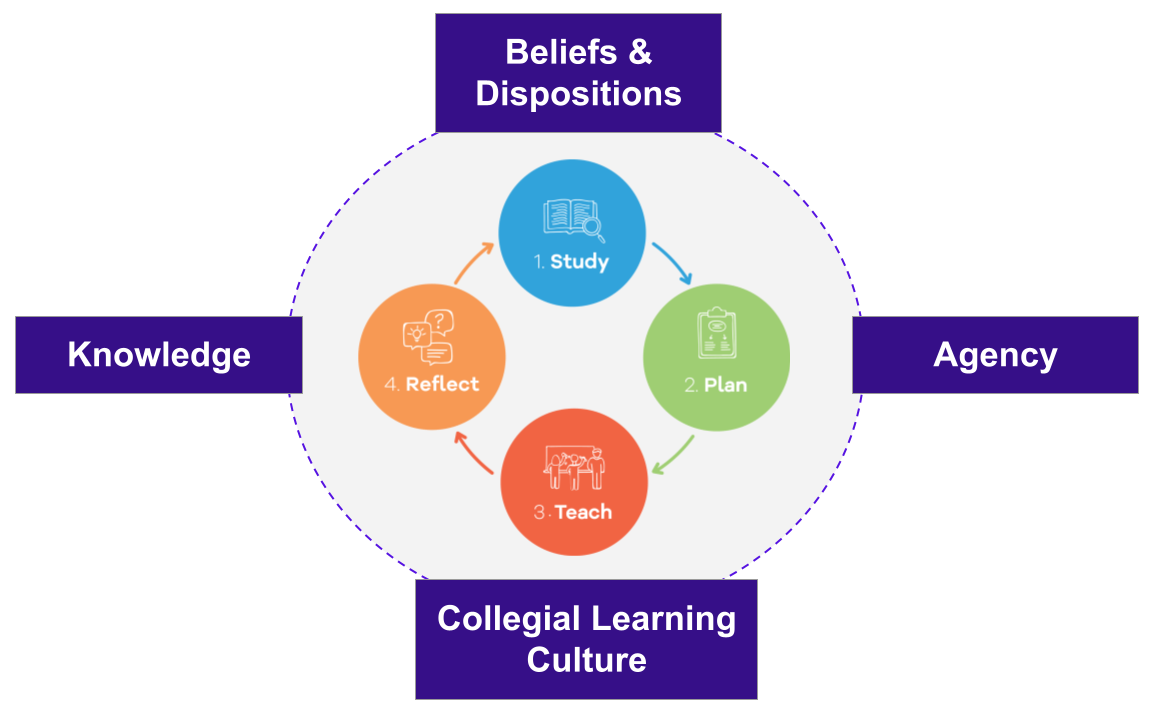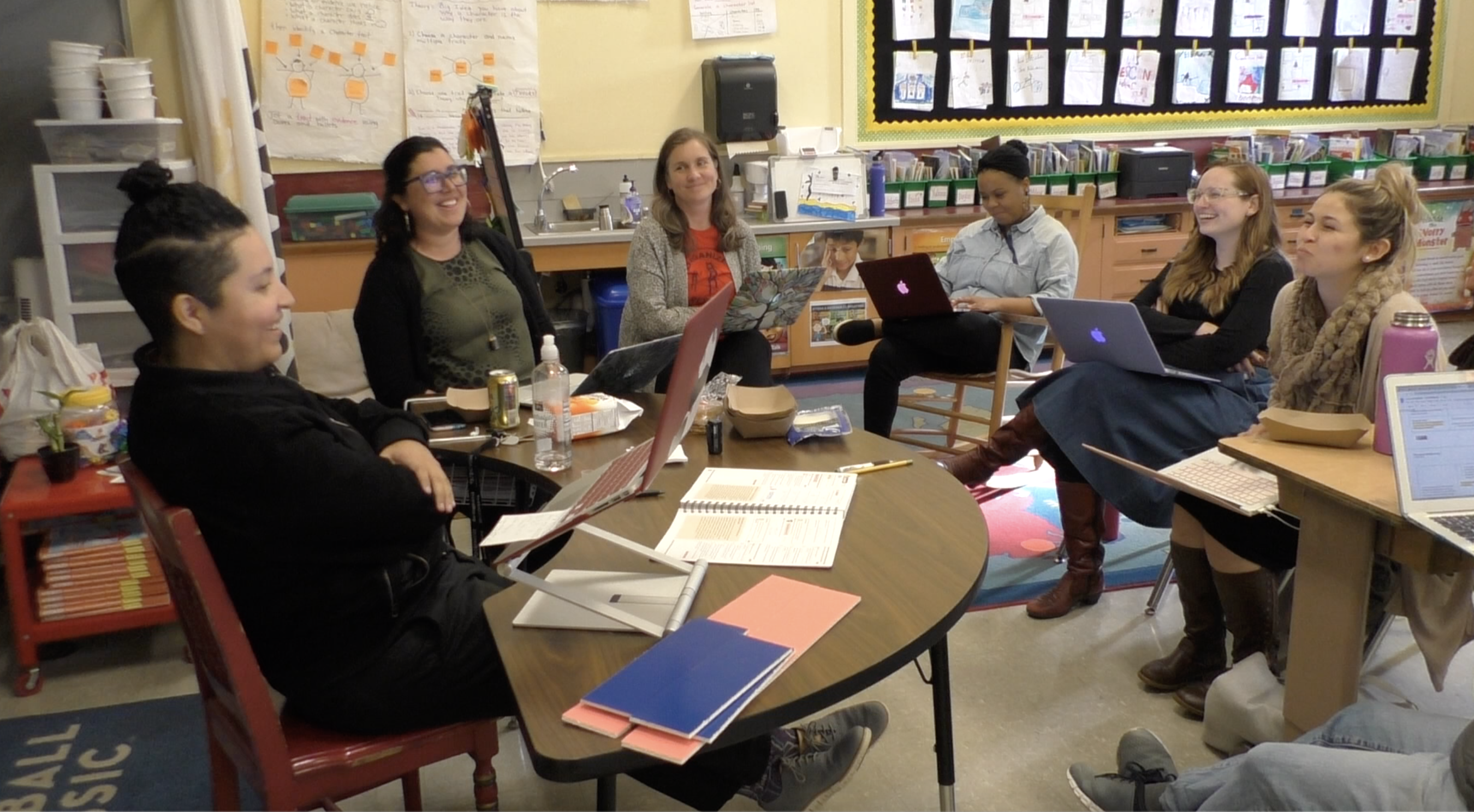Growth Dimensions

Knowledge
Lesson Study can build knowledge about content, curriculum, student thinking, teaching strategies and other areas. In planning your team’s work, it is useful to think about what knowledge you hope your team will build, and to find high-quality resources that will help you build it. Our resources section and fractions resource kit provide some examples.
Beliefs & Dispositions
Lesson Study provides a place for educators to strengthen beliefs and habits that support effective teaching–such as the habit of anticipating student thinking during lesson planning, observing the lesson from the student’s point of view, and considering how student talk (rather than teacher talk) could surface key ideas. Positive shifts in teachers’ beliefs about student capacity to learn are documented by Lesson Study research, along with shifts in beliefs about what constitutes effective instruction.* As a teacher writes, valuable Lesson Study practices become part of daily practice:
“The lesson study process has become embedded in me as an individual even without others there…I’m always thinking what are my goals, what do I expect, what did they understand…how could I make that better? What will I change if I do it again?”
Collegial Learning Culture
Participation in a community allows us to see and to try out new practices, to learn from other community members, and to build an identity as a person who does and believes certain things–for example, that students need to do the heavy mathematical lifting during a lesson, or that student thinking and work needs to be visible on the board, so students can easily read it and use it in discussion. Lesson Study can build both collegial learning structures and collegial relationships that accelerate educators’ learning from one another–not just during team meetings but in daily school life. As one teacher reflected on her team’s experience with Lesson Study:
“It’s changed how we approach our daily lives. We share everything. If I have a great lesson I’ll tell people about it. We’re more confident sharing – previously I wouldn’t have admitted that I did a lesson that was a flop. There used to be a barrier of feeling like you’re stealing if you share lessons. That barrier is gone now”
Agency
Teachers at schools that have built Lesson Study school-wide often use terms like “agency” and “collective efficacy” to capture the changes they experience. What Lesson Study experiences build agency and efficacy? The research lesson often provides an opportunity for teams to try a challenging task or ambitious instructional approach and to build confidence with it. A teacher on a team that studied, and then tried, a Japanese approach to introduce fractions wrote:
“We were interested in how our students would react to such a lesson. We felt that the population of students [in the video] was quite different than ours. We weren’t sure if our students would be as flexible in their thinking; however, we were very pleasantly surprised!”
Reflection on Your Team’s Growth
Awareness of team members’ experiences can help your team notice and nurture all four types of growth. Reflection items like the following may be useful in gauging team members’ experiences. Additional reflection questions are provided on the “Lesson Study Phase” page.
Our work is providing good opportunities to
- Gain knowledge about our topic of study
- Understand the curriculum content and standards more deeply
- Understand students’ thinking and experiences
- Focus on issues of genuine interest to us
- Strengthen relationships among the members of our team
- Learn from colleagues’ practice and thinking
| Growth Dimensions | Example |
|---|---|
KnowledgeIn this clip, teachers share knowledge about how to structure the discussion so students actively build the big mathematical idea (that the size of a fractional share depends on the size of the whole). The planned lesson gives students two strips of paper representing a 2-meter jumping track, and asks them to model two different jumps: a jump of ¼ meter, and a jump of ¼ of their 2-meter jumping track. The team anticipates 5 different student solution methods, linked here, and plans the discussion flow, including specific teacher moves and questions. They also plan how to use magnets with student names on them to prompt every student to show their thinking publicly, a strategy new to some team members. |
Watch video clip part 1 Watch video clip part 2 |
Collegial Learning CultureIn this clip, teachers begin to build a shared vision of the student qualities they want to nurture. |
Watch video clip |
Beliefs and DispositionsIn video clip part 1, team members discuss the language they can use as teachers to support student understanding of fractions. From their readings*, they realize it is problematic to talk about a fraction as “two numbers.” They also pick up the language of “units” and “copies” from their reading, and discuss how this language might support better student understanding of denominators, numerators, and fraction composition. In video clip part 2, as the team begins a mock-up lesson, the research lesson instructor reports back that she is using the language of “unit” and “copies” and has noticed better student understanding than in prior years. |
Watch video clip part 1 Watch video clip part 2 |
AgencyThis clip captures the agency that can come from thinking through many different possible student responses and the pivots that may be needed during instruction. It also highlights teachers’ ownership of Lesson Study as something meant to support their learning and their students’ learning–not as a rigid structure in which they are following someone else’s dictates. |
Watch video clip |
References:
*Lewis, C., & Perry, R. (2015). A randomized trial of lesson study with mathematical resource kits: Analysis of impact on teachers’ beliefs and learning community. In E. J. Cai & Middleton (Ed.), Design, results, and implications of large-scale studies in mathematics education (pp. 133-155). New York: Springer.
*Pernilla, M., & Henrik, H. (2018). Challenging teachers’ ideas about what students need to learn: Teachers’ collaborative work in subject didactic groups. International Journal for Lesson and Learning Studies, 7(2), 98-110.
** Ryan, R. M., & Deci, E. L. (2017). Self-Determination Theory: Basic Psychological Needs in Motivation, Development, and Wellness. The Guilford Press.
